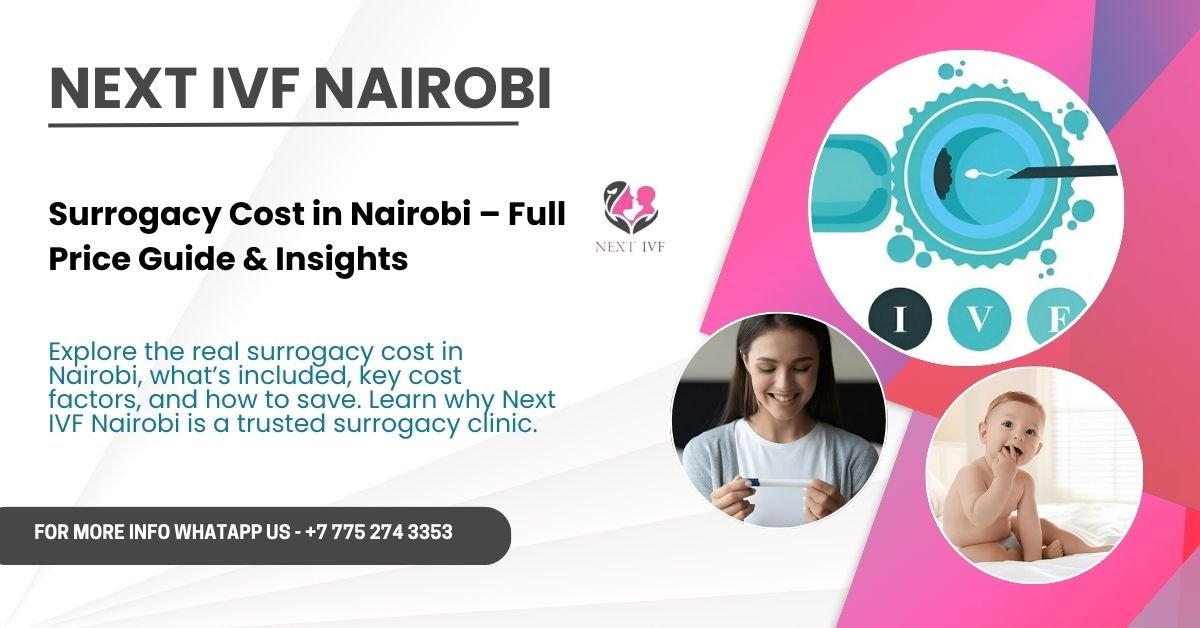Surrogacy Cost in Nairobi
Surrogacy offers a wonderful chance for intended parents to grow their families, especially when traditional methods are not an option. In Nairobi, Kenya, surrogacy has become more accessible and professionally managed, thanks to the rise of advanced fertility clinics, trained medical teams, and supportive legal frameworks. One of the most asked questions by couples and individuals considering surrogacy is: “What is the cost of surrogacy in Nairobi?”
This guide will walk you through all the essential aspects of surrogacy costs in Nairobi — including what’s covered, what additional expenses you might encounter, and how to plan financially for this beautiful journey toward parenthood.
What is surrogacy?
Surrogacy is a method of assisted reproduction where a woman, known as the surrogate, agrees to carry and deliver a baby for another person or couple, known as the intended parents. It is a beautiful option for those who are unable to conceive or carry a pregnancy due to medical, physical, or personal reasons.
There are two main types of surrogacy: gestational and traditional. In gestational surrogacy, the surrogate has no genetic connection to the child. The embryo is created using the egg and sperm of the intended parents (or donors) through IVF (In Vitro Fertilization) and then transferred to the surrogate’s womb. In traditional surrogacy, the surrogate’s own egg is used, making her the biological mother of the baby.
Surrogacy is commonly chosen by couples facing infertility, women with medical complications, single parents, or same-sex couples who wish to become parents. Countries like Kenya and cities like Nairobi are becoming popular surrogacy destinations due to their affordable treatment, expert medical teams, and supportive legal processes.
In essence, surrogacy is a compassionate journey that helps build families and bring joy to people who dream of becoming parents.
Types of Surrogacy
Surrogacy is not one-size-fits-all. There are two main types of surrogacy, and understanding the difference between them can help intended parents choose the best path based on their personal, medical, and legal needs.
1. Traditional Surrogacy
In traditional surrogacy, the surrogate mother uses her own egg, which is fertilized using sperm from the intended father or a donor. This means the surrogate is genetically related to the baby. The fertilization is usually done through IUI (Intrauterine Insemination), where sperm is placed directly into the surrogate’s uterus.
Traditional surrogacy is less common today due to emotional and legal complexities, especially because the surrogate is the biological mother. It may also raise legal challenges around parental rights, which is why many countries do not recommend or permit it.
2. Gestational Surrogacy
Gestational surrogacy is the more widely used and legally accepted option. Here, the surrogate has no genetic link to the baby. The embryo is created using the egg and sperm of the intended parents (or donors) through IVF and then transferred to the surrogate’s womb.
Because the surrogate is not biologically connected to the child, gestational surrogacy is legally simpler and emotionally clearer for all parties involved. It’s a preferred method for couples dealing with infertility, same-sex couples, or women who are unable to carry a pregnancy.
Step-by-Step Surrogacy Process in Nairobi
Surrogacy is a beautiful journey that helps create families when natural conception is not possible. Here’s a friendly guide to understanding how surrogacy in Nairobi typically works:
1. Initial Consultation and Counseling
The journey begins with a meeting at a trusted fertility clinic or surrogacy agency. Both the intended parents and the surrogate receive counseling. This ensures everyone understands the emotional, medical, and legal aspects involved. The doctors explain the full process, including responsibilities, risks, and expectations.
2. Health Checkups and Medical Screening
Medical tests are conducted for the intended parents and the surrogate. These screenings rule out infections or genetic issues and check the surrogate’s uterus to ensure she can safely carry a baby. This is a vital part of building a healthy pregnancy foundation.
3. Legal Agreement
Legal clarity is essential in Nairobi surrogacy clinics. A legal expert helps draft a surrogacy contract that defines roles, compensation (if any), rights, and responsibilities. This agreement protects all parties and is mandatory in ethical surrogacy practices in Nairobi.
4. IVF Procedure and Embryo Creation
Eggs are retrieved from the intended mother or an egg donor, and sperm from the intended father or a donor. These are fertilized in the lab to form embryos. This is the core medical process in surrogacy in Nairobi, carried out in modern IVF labs.
5. Embryo Transfer to the Surrogate
When a healthy embryo is ready, it’s gently transferred into the surrogate’s uterus. This simple procedure is done in a clinic setting and involves minimal discomfort. Hormonal support is given to ensure the best chance of successful implantation.
6. Pregnancy Monitoring
After about two weeks, a pregnancy test confirms if the surrogate has conceived. Once positive, the surrogate’s health is closely monitored through regular scans, check-ups, and blood tests. Intended parents are kept informed and may participate in milestone appointments.
7. Emotional Support
Surrogacy is more than a medical procedure, it’s deeply emotional. Many Nairobi surrogacy clinics provide psychological counseling for both the surrogate and the intended parents. Open communication and mutual respect are encouraged throughout the journey.
8. Delivery of the Baby
When the time comes, the baby is delivered at a reputable hospital under expert care. The intended parents are often present for this life-changing moment. The surrogate hands over the baby as agreed, with love and professionalism.
9. Legal Handover and Documentation
Legal documentation follows after the baby’s birth. The baby’s birth certificate is issued in the name of the intended parents. The legal system in Nairobi supports surrogacy and ensures that the process is completed without complications.
10. Postnatal Care
After delivery, the surrogate receives full medical and emotional support. The intended parents begin a joyful new chapter with their child. The experience of surrogacy in Nairobi is made smoother and safer through compassionate care and strong legal backing.
Surrogacy Cost in Nairobi

The surrogacy cost in Nairobi is considered to be affordable compared to many Western and Asian countries, making Kenya an emerging hub for fertility tourism. The overall cost depends on several factors, including the clinic you choose, the medical condition of the intended parents, surrogate compensation, and whether donor sperm or eggs are used.
On average, the total cost of surrogacy in Nairobi ranges between USD $35,000 to $50,000. This package typically includes:
- IVF treatment and embryo transfer
- Surrogate screening and compensation
- Legal documentation and contracts
- Maternity care for the surrogate
- Delivery expenses
- Baby’s birth certificate and exit documents
- Agency coordination and support
It’s important to note that the Surrogacy Cost in Nairobi can vary depending on whether donor eggs or sperm are used, the number of IVF cycles required, and any complications during pregnancy. Some clinics also offer all-inclusive packages that include accommodation, translators, and post-delivery care.
Despite the lower cost, clinics in Nairobi maintain high medical and ethical standards. Many have internationally trained staff and offer state-of-the-art facilities, ensuring both the surrogate and the intended parents receive the best care.
| Service Component | Estimated Cost (USD) |
| Initial Consultation & Screening | $500 – $1,000 |
| IVF Procedure (including meds) | $4,000 – $6,000 |
| Surrogate Screening & Matching | $1,000 – $2,000 |
| Surrogate Compensation (Full Term) | $12,000 – $18,000 |
| Antenatal Care & Delivery | $3,000 – $5,000 |
| Legal Documentation & Agreements | $2,000 – $3,500 |
The following is the table of expenses involved in the procedure of IVF packages at Next IVF Nairobi :
| Destination Country | Surrogate & Maternity Cost (USD) |
| Surrogacy cost in Nairobi | $35,000 – $55,000 |
| Surrogacy cost in Ukraine | $50,000 – $80,000 |
| Surrogacy cost in the USA | $150,000 – $200,000 |
| Surrogacy cost in Nairobi | $45,000 – $75,000 |
What Factors Influence Surrogacy Cost in Nairobi?
Understanding the factors that affect surrogacy cost in Nairobi can help you plan your journey better. While the average surrogacy cost is lower than in many Western countries, certain elements can increase the total price. Let’s explore:
1. Type of Surrogacy Used
The cost varies depending on whether it’s gestational surrogacy (more common and expensive) or traditional surrogacy. Gestational involves IVF procedures, lab work, and embryo transfer, all of which raise the cost compared to simpler IUI-based traditional surrogacy.
2. Use of Donor Gametes
If donor sperm or donor eggs are required, this will increase the total cost. Screening, storage, and coordination of donor materials involve extra steps and professionals, adding to the expense.
3. Medical Procedures & IVF Cycles
Multiple IVF cycles or additional procedures like ICSI, PGS, or embryo freezing can raise costs. If the first cycle fails, another attempt will cost more, making success rates an important consideration.
4. Surrogate Compensation
In Nairobi, surrogate compensation typically covers living expenses, medical care, and a service fee. Surrogates may also receive bonuses for carrying twins or completing the full term. These costs are a significant part of the package.
5. Clinic & Facility Standards
Clinics with high success rates and advanced technologies may charge more. However, the investment often reflects better care, modern equipment, and skilled staff, which can increase chances of success.
6. Legal and Documentation Fees
Proper contracts and legal services are essential to protect both the intended parents and the surrogate. These include lawyer fees, documentation, notarization, and sometimes court filings, which add to the overall cost.
Why Trust Next IVF Nairobi?

Dealing with infertility can be one of the toughest challenges in life, emotionally and physically. But you don’t have to face it alone. At Next IVF Georgia, we blend the latest medical technology with genuine care and understanding to help you fulfill your dream of becoming parents.
Our center is committed to offering personalised fertility treatments designed just for you. We know how important starting or growing your family is, and our team, including IVF specialists, gynaecologists, embryologists, and caring support staff, is here to guide you at every step.
Why choose Next IVF Nairobi as your fertility partner?
- Comprehensive treatments: From IVF, IUI, frozen embryo transfer to egg and sperm donation, laparoscopy, ICSI, PGD, and male infertility treatments, we cover it all with advanced methods.
- High success rates: Our experienced doctors and proven protocols increase your chances of success.
- Affordable care: We believe quality fertility treatment should be available to everyone, so we offer top-notch care at prices that won’t break the bank.
Don’t wait any longer to start your journey to parenthood. Reach out to Next IVF Nairobi today at +91 7827636596 or email us at info@nextivf.com. Together, we’ll turn your hope into a happy family, with the right center, expert doctors, and heartfelt care.
Conclusion
Understanding the surrogacy cost in Nairobi is an essential part of planning your parenthood journey. Nairobi has become a trusted destination for individuals and couples seeking ethical and affordable surrogacy options.
With modern fertility clinics, compassionate care, and experienced professionals, Nairobi offers a safe and welcoming environment for intended parents from around the world. The surrogacy process here is handled with care, transparency, and professionalism, ensuring both the surrogate and the parents feel supported throughout the journey. If you’re considering surrogacy, exploring your options in Nairobi can offer not only emotional peace but also significant financial relief without compromising on quality. With the right guidance and a clear understanding of the surrogacy cost in Nairobi, your dream of becoming a parent can come true in the most supportive way possible.
Frequently Asked Questions (FAQs)
1. What is the average surrogacy cost in Nairobi?
The average surrogacy cost in Nairobi typically ranges between $35,000 to $50,000 depending on the clinic, surrogate care, IVF requirements, and legal services involved.
2. Are payment plans available for surrogacy in Nairobi?
Yes, many clinics offer flexible payment plans to make the surrogacy cost in Nairobi more manageable for intended parents.
3. Does the cost include legal services?
In most cases, yes. Comprehensive packages for surrogacy in Nairobi usually include legal documentation, surrogate contracts, and court procedures, but it’s best to confirm with the clinic.
4. Is the cost of medication included in the package?
Some clinics include medication in the total surrogacy cost in Nairobi, while others may charge separately. Always request a detailed cost breakdown.
5. How can I reduce surrogacy costs in Nairobi?
Choosing a reliable clinic that offers transparent pricing, comparing packages, and avoiding unnecessary add-ons can help manage the surrogacy cost in Nairobi effectively.
6. Do international patients pay more for surrogacy in Nairobi?
Not necessarily. The surrogacy cost in Nairobi is often the same for both local and international patients, but travel, accommodation, and visa costs will be extra.
Read Also:


